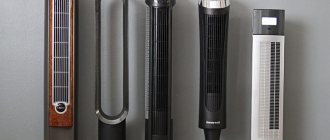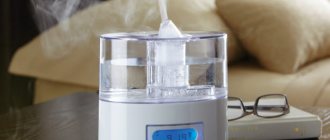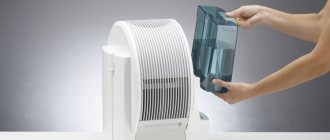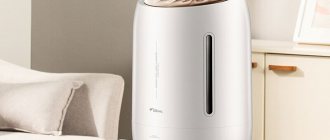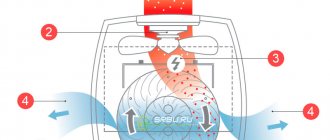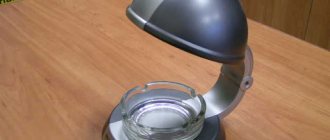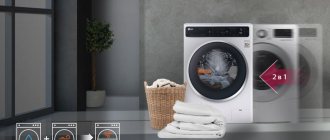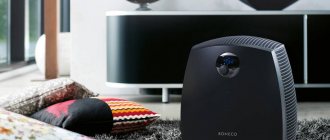A photocatalytic air purifier is a modern climate control device that can cope with many organic pollutants, gases and even viruses. Used in medical and children's institutions, it is effective for the prevention of infectious diseases. This device is economical, safe, and easy to use. With its help you can create a comfortable microclimate in your home.
| Name | Average price, rub | Serviced area |
| Air purifier AIC CF8410 | 9449 | 35 sq.m |
| Air purifier AIC CF8005 | 8400 | 21 sq.m |
| Air purifier AIC XJ-4000 | 20499 | 50 sq.m |
| Air Purifier AIC CF8500 | 11665 | 40 sq.m |
| Air purifier AIC KJF-20B06/20S06 | 13400 | 40 sq.m |
| Air purifier AIC XJ-4600 | 43990 | 120 sq.m |
| Air purifier AIC XJ-3800A1 | 20500 | 50 sq.m |
| Air purifier AIC XJ-4100 | 10399 | 30 sq.m |
| Air purifier ATMOS Maxi-105 | 14900 | |
| Air purifier ATMOS Maxi-212 | 29000 | 45 sq.m |
| Air purifier ATMOS Maxi-205 | 19950 | |
| Air purifier ATMOS Maxi-112 | 18490 | 50 sq.m |
| Timberk TAP FL600 MF Air Purifier | 12634 | 25 sq.m |
pros
Compared to other types of purifiers, photocatalytic purifiers have many advantages:
- no need to clean and change filters frequently, the UV lamp is changed once a year;
- contaminants are decomposed into safe compounds, so dirt does not accumulate anywhere;
- effectively removes odors of smoke, burning, and gases from the air;
- cleanses from toxic gases and fumes of household chemicals;
- destroys bacteria, viruses, fungi;
- eliminates allergens;
- has low power consumption.
Advantages and disadvantages
In order to have no doubt about which purifier to choose, you need to choose its model after studying all the advantages and disadvantages. The presence of photocatalytic filters in an air purifier has a number of additional advantages, in addition to those already mentioned:
- Economical. Since the device does not need to drive air masses under high pressure, it has a very low energy consumption coefficient.
- Environmentally friendly. The breakdown of any kind of pollution is carried out only into components that are absolutely safe for humans and the environment.
- Ease of maintenance. This device can be cleaned with a vacuum cleaner only once throughout the year.
It is worth saying that this device, like any other, has its drawbacks. This is worth considering when choosing an air purifier. So, the disadvantages of the device include:
- It is impossible to purify the air from inorganic pollution with their help. So, for example, during repair, construction or finishing work, this air purifier will be absolutely useless.
- Complete purification of air masses from bacteria, including beneficial ones. This disadvantage is most important for families with children, since a bacteria-free environment is the main enemy of children's immunity.
We recommend that you read: Which filter for kitchen hoods is better?
How to choose
There are different models of photocatalytic purifiers. When choosing, you need to pay attention not only to the design and cost of the device. More important are characteristics such as power, performance, type of filtration, and the presence of additional options.
Performance
The performance of the device determines how much air passes through it per hour. It is advisable that all the air from the room is purified 2-3 times during this time.
Serviced area
Its power depends on the area for which the air purifier is designed. It is not recommended to purchase powerful appliances for a small room - they will consume a lot of electricity.
Noise
This device operates almost silently. The sound is made only by the fan, which sucks air in and throws it out after cleaning. If the device will be used at night, it is better to choose a model with a low noise level.
Filters
In addition to the photocatalytic filter, many devices install other filters. This increases the effectiveness of cleansing. Therefore, if a small child or an allergy sufferer lives in the house, you need to choose a purifier with multi-stage filtration.
- Pre-cleaning. This filter is required in all purifiers. It cleans the air from large particles of dust and debris. This protects the remaining filters from clogging and increases operating efficiency.
- Electrostatic. This filter creates an electrostatic charge that attracts dust, hair, epidermal particles, and soot. Easily washed with water.
- NERA. This is the most common filter that can filter up to 99% of contaminants, even the smallest particles. It is most often combined with a photocatalytic filter. Such devices effectively purify and disinfect the air; they are recommended for use in children's rooms and bedrooms.
- UPL. This is a more efficient HEPA type filter. Detains 100% of contaminants, effective against dust, microorganisms, chemicals.
- Carbonic. This filter is only used in conjunction with other types. It traps odors and large particles. When it becomes clogged, it needs to be changed.
Additional options
Additional functions of the device increase its efficiency. You can choose a model with a humidifier and a pollution sensor. There are devices with a self-cleaning function. But several options are the most convenient and most in demand.
- Ionizer. If the device can ionize the air, its cleaning efficiency increases several times. Due to the presence of negatively charged ions, dust particles and other contaminants become electrified, sticking to various surfaces. And breathing ionized air is much easier.
- Ozonation. If this function is present, the device produces ozone molecules. They disinfect the air, increasing the cleaning efficiency. It is desirable that ozonation does not occur constantly, but can be turned on for several minutes. After all, large amounts of ozone can be harmful to health.
- Auto power off. This is a convenient feature when the device turns off automatically at a specified time.
- Aromatization. The ability to add essential oils makes the device convenient for aromatherapy. The air, passing through a special capsule, is saturated with esters and acquires a pleasant aroma.
Reviews
Reviews from other buyers will help you understand whether such an air purifier is worth buying.
Photocatalytic air purifier is becoming increasingly popular. It effectively copes with organic contaminants, chemicals and unpleasant odors.
Principle of operation
This type of climate control equipment, in general terms, consists of a catalyst and an ultraviolet lamp. As a result of their interaction, air masses are purified. Ultraviolet rays directed at the catalyst lead to the phenomenon of photocatalysis - the formation of a natural substance with high oxidizing ability. It is this substance that is intended to destroy all pollutants from the airspace that have settled on the surface of the catalyst.
We recommend that you read: Types of decorative grilles for ventilation
In air purifiers with a photocatalytic system, the filter material most often is porous glass. It has high absorbent properties and is able to retain even the smallest particles. The most commonly used catalyst is titanium dioxide.
A photocatalytic air purifier cannot accumulate contaminants, microorganisms, dust, etc. - and there is no need to replace the filter, since the device cleans itself. In addition, air purifiers with photocatalytic filters provide additional humidification of the air in the room, since during their operation water evaporates from the air flow.
By choosing a photocatalytic purifier, you save yourself from the need to breathe:
- Exhaust and carbon monoxide.
- Nitrogen oxides.
- Phenols and formaldehydes.
- Tobacco smoke.
- Dust and soot.
- Domestic, plant and animal allergens.
- Ammonia and hydrogen sulfide.
- Harmful and unpleasant food odors.
- Pathogenic bacteria and viruses, in particular influenza, tuberculosis, mold.
- Toxic organic compounds of household and industrial origin.
Rating of photocatalytic air purifiers
Air purifier AIC CF8410
Advantages:
- Cleans the air well
- Appearance
- Very quiet at 1st speed
- Build quality
- Simplicity of design
Flaws:
- Noisy at 2 and 3 speeds
- Dust gets on the top grill
- Weight
- Floor installation
Air purifier AIC CF8005
Advantages:
- Compact
- Easy to move
- A set of different cleaning functions
- Convenient filter change
- Effective
Flaws:
- Noisy at maximum speed
- Few timer gradations
Air purifier AIC XJ-4000
Advantages:
- There is a quartz mode
- Remote controller
- Available consumables
- Effective
- Many modes
Flaws:
- Dimensions
- The air flow goes to the side
- Not suitable for large rooms
Air Purifier AIC CF8500
Advantages:
- Quiet
- Design
- Effectively cleans the air
Flaws:
- Noisy
- Bright LEDs are annoying at night
- No air pollution sensor
Air purifier AIC KJF-20B06/20S06
Advantages:
- Many operating modes
- Quiet enough
- Compact
- Effectively cleans the air
- Convenient control
Flaws:
- Difficult to find replacement filters
- Inconvenient to change filters
Air purifier AIC XJ-4600
Advantages:
- Easy to clean
- Comfortable in using
- Cleans the air well
- No filter replacement required
Flaws:
- Noisy
- Short power wire
Air purifier AIC XJ-3800A1
Advantages:
- Design
- Absorbs allergens well
- Remote controller
- Easy to use
- Many stages of air purification
Flaws:
- Inconvenient auto mode
- Noise at high speeds
- Quality of materials
Air purifier AIC XJ-4100
Advantages:
- Compact
- Simple controls
- No additional consumables needed
- Quiet
Flaws:
- Noisy
- Build quality
- Short cord
Air purifier ATMOS Maxi-105
Advantages:
- Appearance
- Quality of materials
- Cleans the air well
- Convenient control
Flaws:
- Price
Air purifier ATMOS Maxi-212
Advantages:
- Quiet
- Effective
- Easy to manage
- Timer
- Availability of remote control
Flaws:
- Dimensions
- Design
Air purifier ATMOS Maxi-205
Advantages:
- Appearance
- Easy to use
- Effectively purifies the air
- Remote controller
Flaws:
- Noisy
Air purifier ATMOS Maxi-112
Advantages:
- Design
- Remote control
- Quiet
- Comfortable in using
Flaws:
- Noisy at maximum speed
Timberk TAP FL600 MF Air Purifier
Advantages:
- Compact
- Effectively removes odors from the air
- Easy to clean
- Simple controls
Flaws:
- Noisy in some modes
- Quality of materials
What air pollutants can a photocatalytic air purifier handle:
- Any unpleasant odors. Almost all odors are formed by organic compounds, so they easily decompose and disappear.
- Smoke, incl. tobacco, smoke, soot, smog
- Harmful toxic substances: carbon monoxide, formaldehyde, ammonia, nitrogen oxides, hydrogen sulfide, phenols, exhaust gases
- Toxic organic compounds: chlorine, ethers, hydrocarbons (for example, fumes from household cleaning products)
- Allergens: dust mite feces
- Pathogenic viruses, bacteria
- Various microorganisms: mold, mildew, dust mite
According to the results of recent studies, devices with carbon filters cannot cope with light compounds - formaldehyde, nitrogen oxides, carbon monoxide - the most typical urban air pollutants.
For example, formaldehyde is released from furniture, construction and finishing materials. It impairs the functioning of the respiratory system and nervous system. Carbon filters cannot clean the air of formaldehyde, but photocatalytic filters effectively cope with any toxic fumes.
Non-carbon and carbon filters are also ineffective in the fight against bacteria, viruses, microorganisms that live in the air of most rooms and provoke the occurrence of diseases. If the design of the device does not provide an ultraviolet lamp, then microorganisms captured by the filter often continue to multiply on it. A photocatalytic purifier, using the resulting oxidants, damages the outer shell of microbes, as a result they die, and the air is disinfected. Such devices destroy even the most dangerous microbes for humans: E. coli, Staphylococcus aureus and mold.
